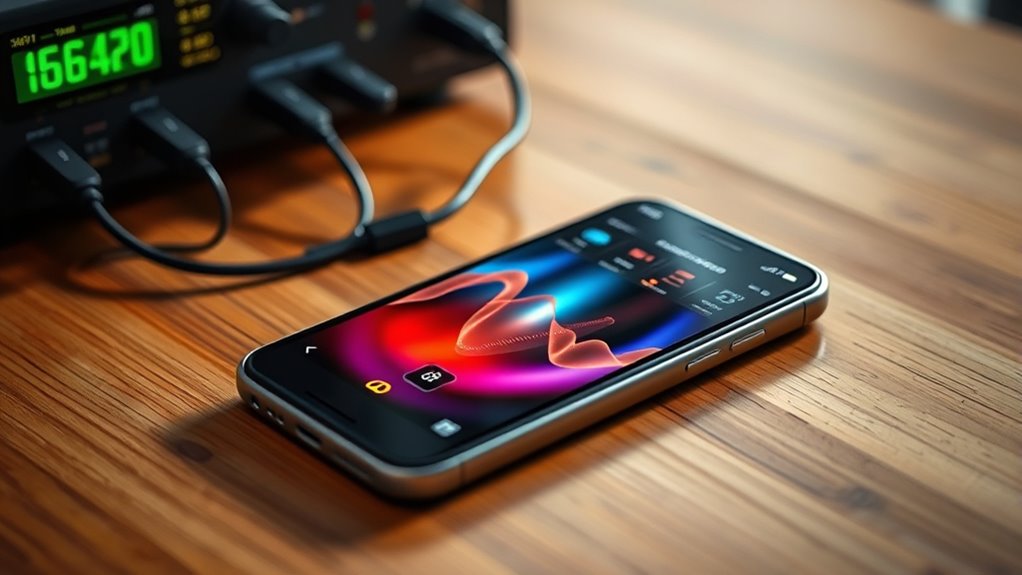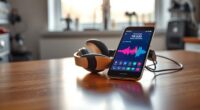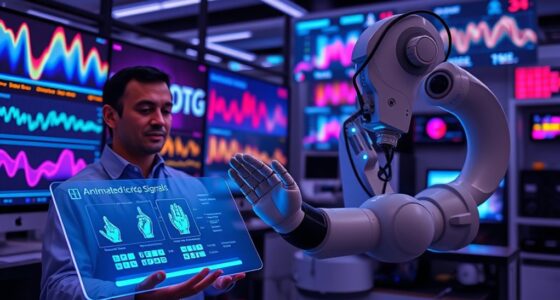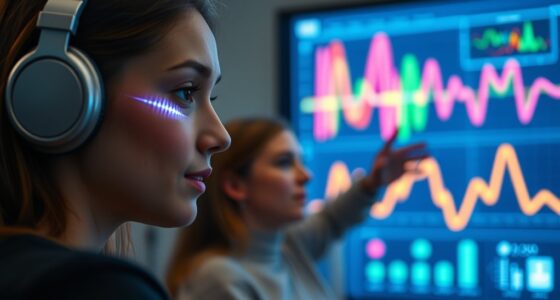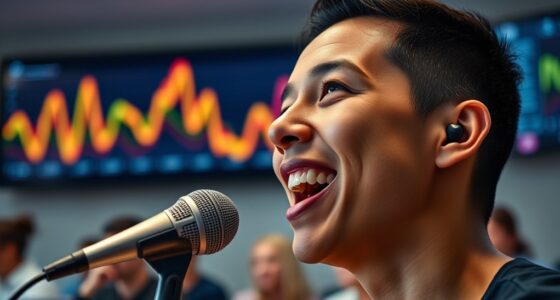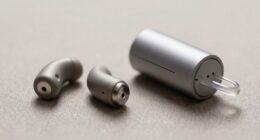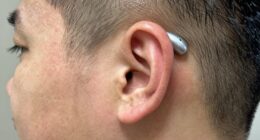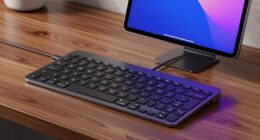AI hearing test apps have transformed traditional lab-based diagnostics into accessible tools you can use on your smartphone. They incorporate advanced algorithms, making remote testing quick, reliable, and user-friendly, even without medical expertise. These apps address challenges like device variation and noise, ensuring accuracy while prioritizing your privacy. As technology improves, these apps will offer even more personalized insights. Continuing this journey reveals how these innovations are changing hearing health care for everyone.
Key Takeaways
- Developing AI hearing test apps involves translating laboratory algorithms into user-friendly smartphone interfaces.
- Extensive data collection and testing ensure accuracy across diverse devices, environments, and users.
- App design emphasizes intuitive interfaces, clear instructions, and real-time feedback for effective self-assessment.
- Ensuring privacy and data security aligns app deployment with regulations like HIPAA, fostering user trust.
- Future advancements focus on personalized insights and integrating additional health data for improved accuracy.
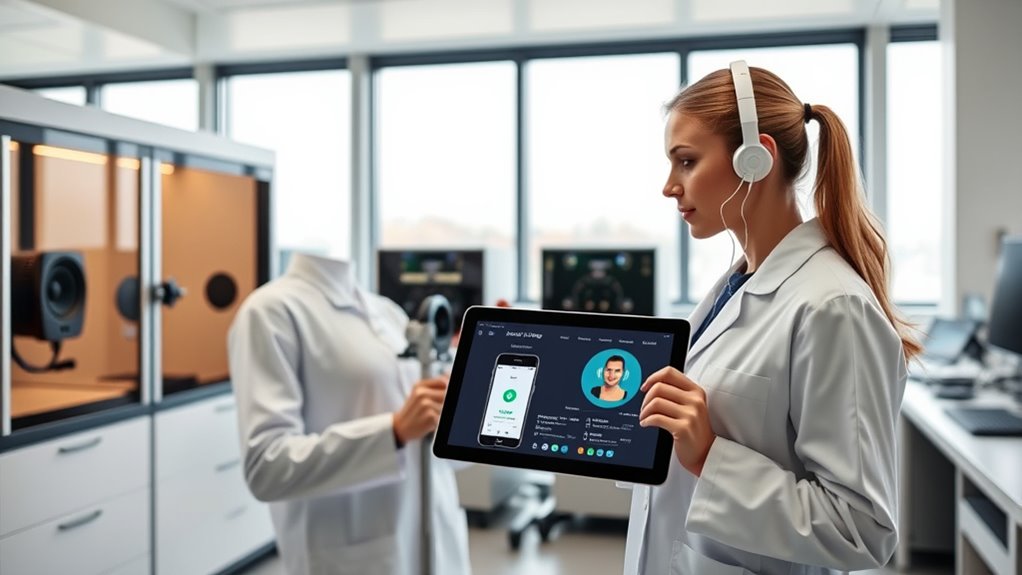
Advances in artificial intelligence are transforming healthcare, making advanced diagnostic tools more accessible than ever before. Now, you can perform complex health assessments right from your smartphone, and AI hearing test apps are leading this revolution. These apps aim to provide quick, reliable hearing assessments without the need for in-person visits. As you navigate this new technology, you’ll notice that creating a seamless user experience is essential. Developers focus on making the app intuitive, so you don’t need medical training to use it effectively. Clear instructions, straightforward interfaces, and real-time feedback help you understand your hearing health easily. This user-centric approach guarantees you stay engaged and confident in the testing process, even if you’re not tech-savvy. However, developing these apps isn’t without technical challenges. Ensuring accurate results across diverse environments and devices requires sophisticated algorithms and robust calibration. Variations in smartphone hardware, ambient noise, and user behavior can all impact test accuracy. Overcoming these obstacles demands extensive data collection, rigorous testing, and continuous refinement of the AI models. Developers must also address latency issues to deliver real-time results, which is essential for user trust and engagement. Furthermore, safeguarding your privacy is a top priority. Handling sensitive health data securely, complying with regulations like HIPAA, and ensuring that your personal information remains confidential involve complex technical solutions. Building these safeguards into an AI hearing test app requires careful planning and ongoing updates. Additionally, leveraging insights from AI in Education can inform the development of adaptive testing algorithms that better personalize assessments for individual users. Despite these hurdles, the potential benefits are significant. You gain quick access to hearing assessments wherever you are, enabling early detection of issues and prompting timely consultation with healthcare providers. The convenience and immediacy of a smartphone app can motivate you to monitor your hearing health regularly, something that traditional testing often overlooks. As the technology advances, expect these apps to incorporate more sophisticated AI that adapts to your unique hearing profile, providing personalized insights and recommendations. Developers are also working to improve the accuracy of these tests by integrating additional data sources, such as your age, lifestyle, and environmental factors. Ultimately, the journey from lab-based testing to smartphone apps is reshaping how you manage your hearing health. While technical challenges remain, ongoing innovations continue to enhance user experience, making hearing assessments more accessible, reliable, and user-friendly than ever before. This shift empowers you to take control of your health, leveraging AI to support early detection and better hearing care right at your fingertips.
Frequently Asked Questions
How Accurate Is the AI Hearing Test Compared to Clinical Exams?
Your AI hearing test can be quite accurate, especially when it uses precise calibration methods and assesses hearing thresholds effectively. While it may not replace extensive clinical exams, it provides reliable results for initial screening. The accuracy depends on proper calibration of your device and consistent testing conditions. Keep in mind, for detailed diagnosis and treatment, consulting a professional is always recommended.
Is the App Suitable for All Age Groups?
You might wonder if the app suits all age groups. While it’s designed with accessibility features to accommodate various needs, age suitability can vary. Young children and seniors may find it less effective without proper guidance or adjustments. Always check the app’s specific age recommendations and accessibility options. For extensive results, consult a professional, especially for very young or older users.
How Does the AI Personalize Hearing Assessments?
AI personalizes hearing assessments through advanced personalization algorithms and user calibration. You start by performing simple calibration steps, which help the app understand your specific hearing profile. The algorithms then analyze your responses to customize tests, ensuring accurate results tailored to your unique hearing capabilities. This process makes the assessment more precise and relevant, providing you with a better understanding of your hearing health without needing a visit to a specialist.
What Are the Privacy Protections for User Data?
You’re protected through strong data encryption, which keeps your hearing test results safe from unauthorized access. The app also requires your explicit user consent before collecting any personal information, ensuring you control what data is shared. Plus, privacy policies clearly outline how your data is used and stored, giving you peace of mind. Rest assured, your confidentiality is a top priority in safeguarding your information.
Can the App Detect Specific Types of Hearing Loss?
Imagine your hearing is like a garden, with different plants representing hearing loss types. The app acts as a skilled gardener, customizing tests to identify specific issues. Yes, it detects various hearing loss types by analyzing your responses, allowing for tailored insights. This app customization guarantees you get precise results, helping you understand your unique hearing needs and guiding you toward appropriate solutions.
Conclusion
Now, you’ve seen how this AI hearing test app went from a lab experiment to your smartphone. It’s a game-changer, making hearing health more accessible than ever. With this technology in your hands, you can catch issues early and stay ahead of the game. Remember, when it comes to health, it’s better to be safe than sorry. So, don’t wait—embrace the future and keep your ears in tip-top shape!

